Air Pie: International Management Report: Cultural Impact on Business
VerifiedAdded on 2020/06/03
|10
|2577
|90
Report
AI Summary
This report provides a comprehensive analysis of international management strategies for Air Pie, a fast-food restaurant expanding into the United States and Japan. It examines the role of culture in shaping international business, focusing on the impact of American and Japanese food cultures on tastes, preferences, demand patterns, cultural values, and communication. The report further explores the implications of cultural variations on management, organizational strategy, and operations, emphasizing the importance of adapting to local norms and preferences. It outlines strategies to overcome cultural differences, including gaining detailed cultural knowledge, respecting cultural values, and minimizing differences. The report also highlights the importance of self-awareness and sensitivity to cultural diversity within the organization, including training and awareness programs for managers and employees. The conclusion emphasizes the importance of a culturally sensitive approach for Air Pie's successful international expansion.
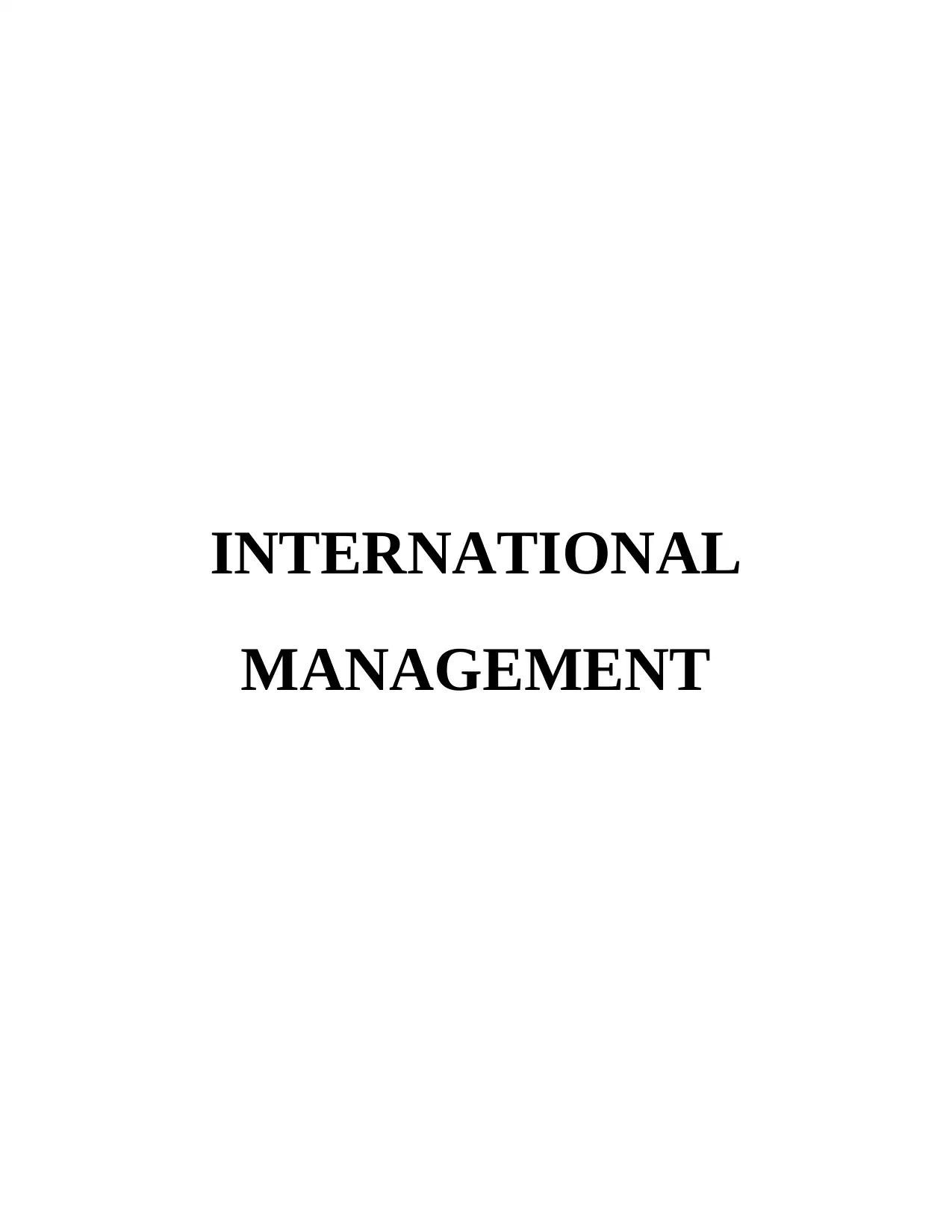
INTERNATIONAL
MANAGEMENT
MANAGEMENT
Paraphrase This Document
Need a fresh take? Get an instant paraphrase of this document with our AI Paraphraser
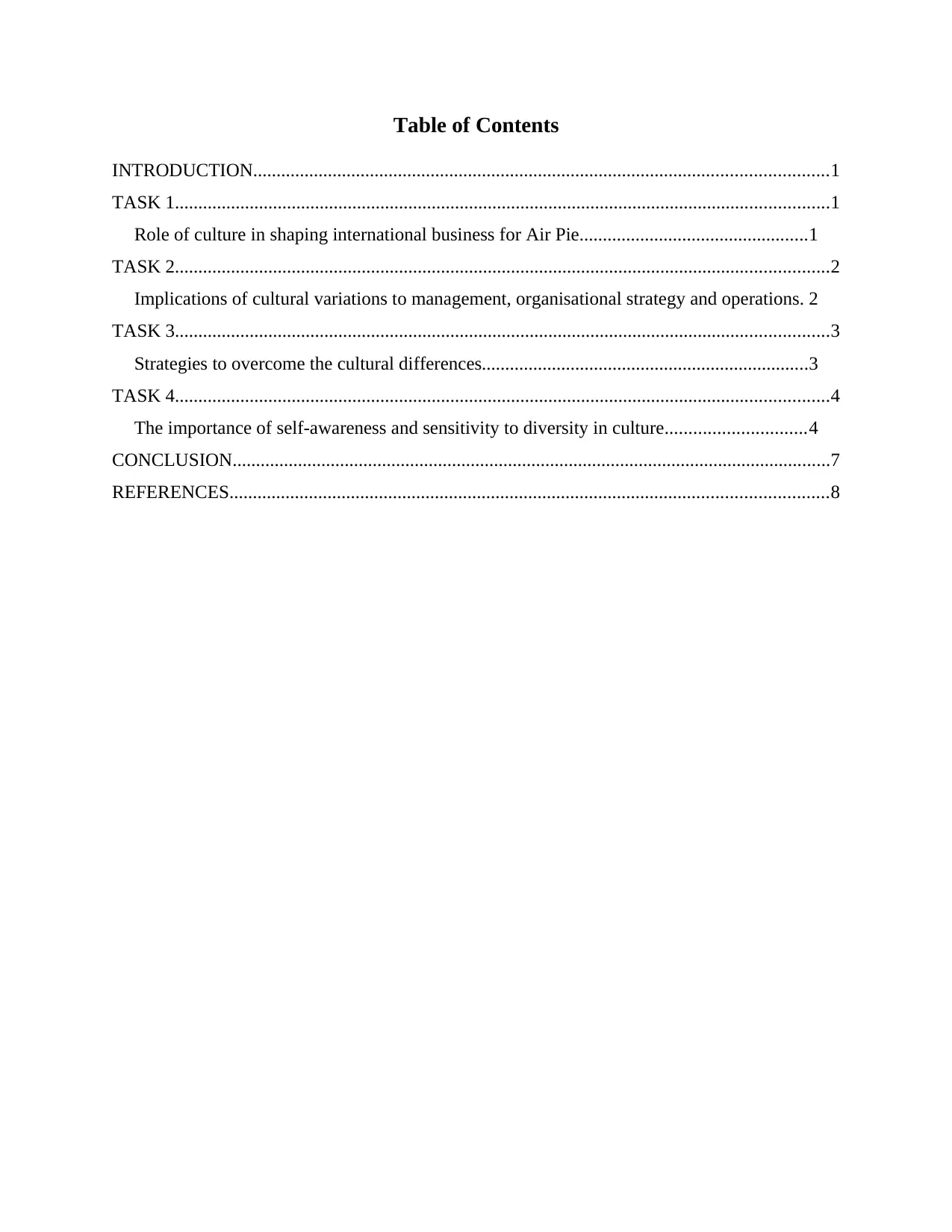
Table of Contents
INTRODUCTION...........................................................................................................................1
TASK 1............................................................................................................................................1
Role of culture in shaping international business for Air Pie.................................................1
TASK 2............................................................................................................................................2
Implications of cultural variations to management, organisational strategy and operations. 2
TASK 3............................................................................................................................................3
Strategies to overcome the cultural differences......................................................................3
TASK 4............................................................................................................................................4
The importance of self-awareness and sensitivity to diversity in culture..............................4
CONCLUSION................................................................................................................................7
REFERENCES................................................................................................................................8
INTRODUCTION...........................................................................................................................1
TASK 1............................................................................................................................................1
Role of culture in shaping international business for Air Pie.................................................1
TASK 2............................................................................................................................................2
Implications of cultural variations to management, organisational strategy and operations. 2
TASK 3............................................................................................................................................3
Strategies to overcome the cultural differences......................................................................3
TASK 4............................................................................................................................................4
The importance of self-awareness and sensitivity to diversity in culture..............................4
CONCLUSION................................................................................................................................7
REFERENCES................................................................................................................................8
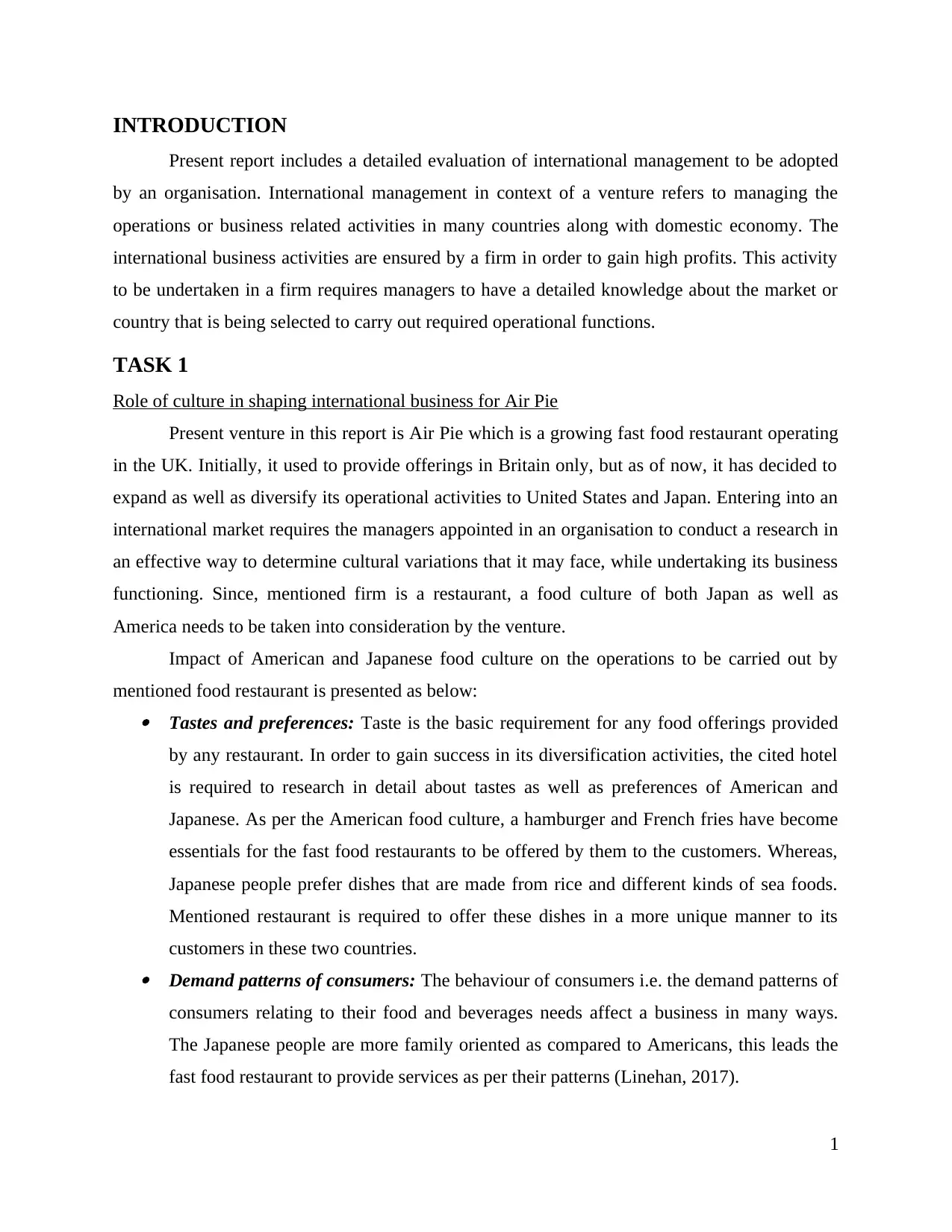
INTRODUCTION
Present report includes a detailed evaluation of international management to be adopted
by an organisation. International management in context of a venture refers to managing the
operations or business related activities in many countries along with domestic economy. The
international business activities are ensured by a firm in order to gain high profits. This activity
to be undertaken in a firm requires managers to have a detailed knowledge about the market or
country that is being selected to carry out required operational functions.
TASK 1
Role of culture in shaping international business for Air Pie
Present venture in this report is Air Pie which is a growing fast food restaurant operating
in the UK. Initially, it used to provide offerings in Britain only, but as of now, it has decided to
expand as well as diversify its operational activities to United States and Japan. Entering into an
international market requires the managers appointed in an organisation to conduct a research in
an effective way to determine cultural variations that it may face, while undertaking its business
functioning. Since, mentioned firm is a restaurant, a food culture of both Japan as well as
America needs to be taken into consideration by the venture.
Impact of American and Japanese food culture on the operations to be carried out by
mentioned food restaurant is presented as below: Tastes and preferences: Taste is the basic requirement for any food offerings provided
by any restaurant. In order to gain success in its diversification activities, the cited hotel
is required to research in detail about tastes as well as preferences of American and
Japanese. As per the American food culture, a hamburger and French fries have become
essentials for the fast food restaurants to be offered by them to the customers. Whereas,
Japanese people prefer dishes that are made from rice and different kinds of sea foods.
Mentioned restaurant is required to offer these dishes in a more unique manner to its
customers in these two countries. Demand patterns of consumers: The behaviour of consumers i.e. the demand patterns of
consumers relating to their food and beverages needs affect a business in many ways.
The Japanese people are more family oriented as compared to Americans, this leads the
fast food restaurant to provide services as per their patterns (Linehan, 2017).
1
Present report includes a detailed evaluation of international management to be adopted
by an organisation. International management in context of a venture refers to managing the
operations or business related activities in many countries along with domestic economy. The
international business activities are ensured by a firm in order to gain high profits. This activity
to be undertaken in a firm requires managers to have a detailed knowledge about the market or
country that is being selected to carry out required operational functions.
TASK 1
Role of culture in shaping international business for Air Pie
Present venture in this report is Air Pie which is a growing fast food restaurant operating
in the UK. Initially, it used to provide offerings in Britain only, but as of now, it has decided to
expand as well as diversify its operational activities to United States and Japan. Entering into an
international market requires the managers appointed in an organisation to conduct a research in
an effective way to determine cultural variations that it may face, while undertaking its business
functioning. Since, mentioned firm is a restaurant, a food culture of both Japan as well as
America needs to be taken into consideration by the venture.
Impact of American and Japanese food culture on the operations to be carried out by
mentioned food restaurant is presented as below: Tastes and preferences: Taste is the basic requirement for any food offerings provided
by any restaurant. In order to gain success in its diversification activities, the cited hotel
is required to research in detail about tastes as well as preferences of American and
Japanese. As per the American food culture, a hamburger and French fries have become
essentials for the fast food restaurants to be offered by them to the customers. Whereas,
Japanese people prefer dishes that are made from rice and different kinds of sea foods.
Mentioned restaurant is required to offer these dishes in a more unique manner to its
customers in these two countries. Demand patterns of consumers: The behaviour of consumers i.e. the demand patterns of
consumers relating to their food and beverages needs affect a business in many ways.
The Japanese people are more family oriented as compared to Americans, this leads the
fast food restaurant to provide services as per their patterns (Linehan, 2017).
1
⊘ This is a preview!⊘
Do you want full access?
Subscribe today to unlock all pages.

Trusted by 1+ million students worldwide
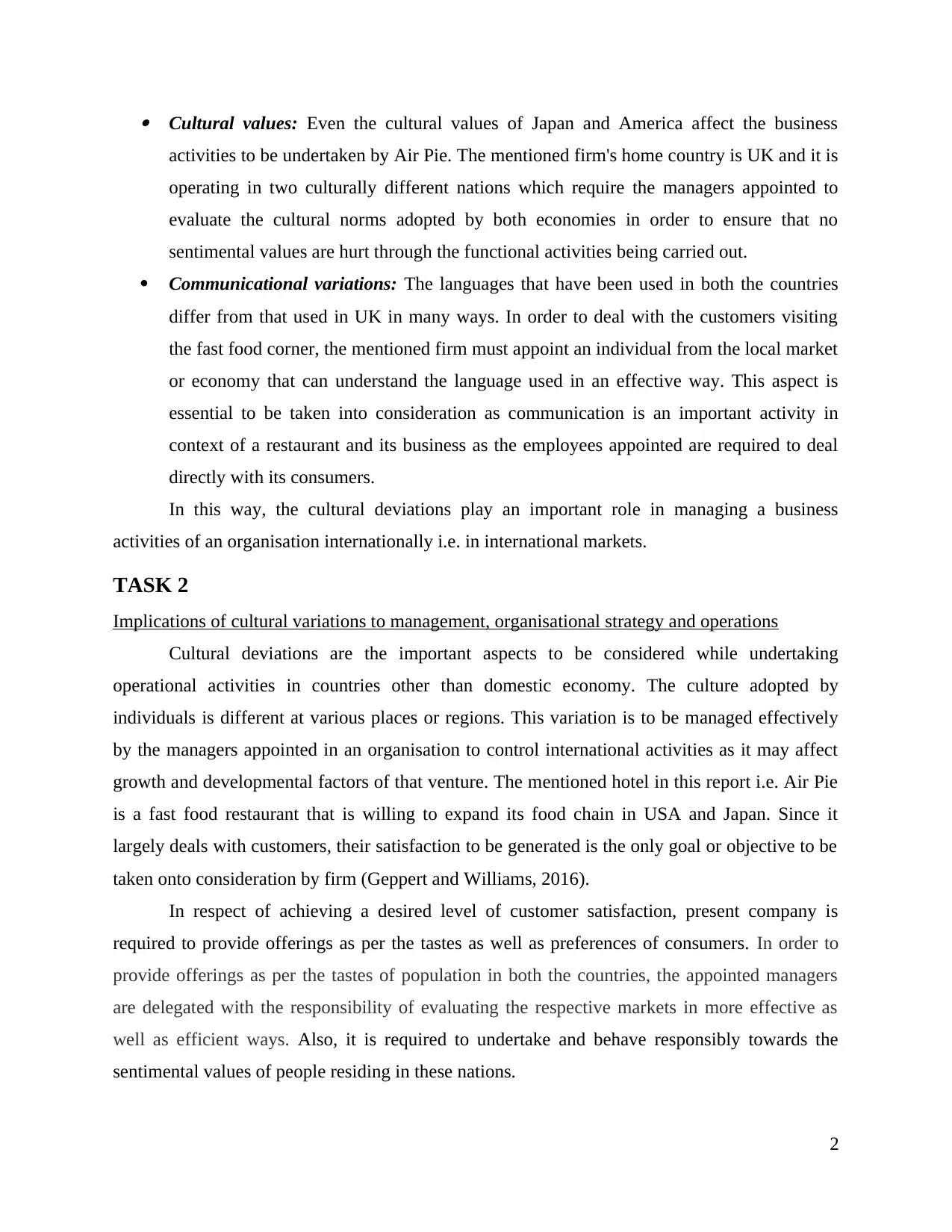
Cultural values: Even the cultural values of Japan and America affect the business
activities to be undertaken by Air Pie. The mentioned firm's home country is UK and it is
operating in two culturally different nations which require the managers appointed to
evaluate the cultural norms adopted by both economies in order to ensure that no
sentimental values are hurt through the functional activities being carried out.
Communicational variations: The languages that have been used in both the countries
differ from that used in UK in many ways. In order to deal with the customers visiting
the fast food corner, the mentioned firm must appoint an individual from the local market
or economy that can understand the language used in an effective way. This aspect is
essential to be taken into consideration as communication is an important activity in
context of a restaurant and its business as the employees appointed are required to deal
directly with its consumers.
In this way, the cultural deviations play an important role in managing a business
activities of an organisation internationally i.e. in international markets.
TASK 2
Implications of cultural variations to management, organisational strategy and operations
Cultural deviations are the important aspects to be considered while undertaking
operational activities in countries other than domestic economy. The culture adopted by
individuals is different at various places or regions. This variation is to be managed effectively
by the managers appointed in an organisation to control international activities as it may affect
growth and developmental factors of that venture. The mentioned hotel in this report i.e. Air Pie
is a fast food restaurant that is willing to expand its food chain in USA and Japan. Since it
largely deals with customers, their satisfaction to be generated is the only goal or objective to be
taken onto consideration by firm (Geppert and Williams, 2016).
In respect of achieving a desired level of customer satisfaction, present company is
required to provide offerings as per the tastes as well as preferences of consumers. In order to
provide offerings as per the tastes of population in both the countries, the appointed managers
are delegated with the responsibility of evaluating the respective markets in more effective as
well as efficient ways. Also, it is required to undertake and behave responsibly towards the
sentimental values of people residing in these nations.
2
activities to be undertaken by Air Pie. The mentioned firm's home country is UK and it is
operating in two culturally different nations which require the managers appointed to
evaluate the cultural norms adopted by both economies in order to ensure that no
sentimental values are hurt through the functional activities being carried out.
Communicational variations: The languages that have been used in both the countries
differ from that used in UK in many ways. In order to deal with the customers visiting
the fast food corner, the mentioned firm must appoint an individual from the local market
or economy that can understand the language used in an effective way. This aspect is
essential to be taken into consideration as communication is an important activity in
context of a restaurant and its business as the employees appointed are required to deal
directly with its consumers.
In this way, the cultural deviations play an important role in managing a business
activities of an organisation internationally i.e. in international markets.
TASK 2
Implications of cultural variations to management, organisational strategy and operations
Cultural deviations are the important aspects to be considered while undertaking
operational activities in countries other than domestic economy. The culture adopted by
individuals is different at various places or regions. This variation is to be managed effectively
by the managers appointed in an organisation to control international activities as it may affect
growth and developmental factors of that venture. The mentioned hotel in this report i.e. Air Pie
is a fast food restaurant that is willing to expand its food chain in USA and Japan. Since it
largely deals with customers, their satisfaction to be generated is the only goal or objective to be
taken onto consideration by firm (Geppert and Williams, 2016).
In respect of achieving a desired level of customer satisfaction, present company is
required to provide offerings as per the tastes as well as preferences of consumers. In order to
provide offerings as per the tastes of population in both the countries, the appointed managers
are delegated with the responsibility of evaluating the respective markets in more effective as
well as efficient ways. Also, it is required to undertake and behave responsibly towards the
sentimental values of people residing in these nations.
2
Paraphrase This Document
Need a fresh take? Get an instant paraphrase of this document with our AI Paraphraser
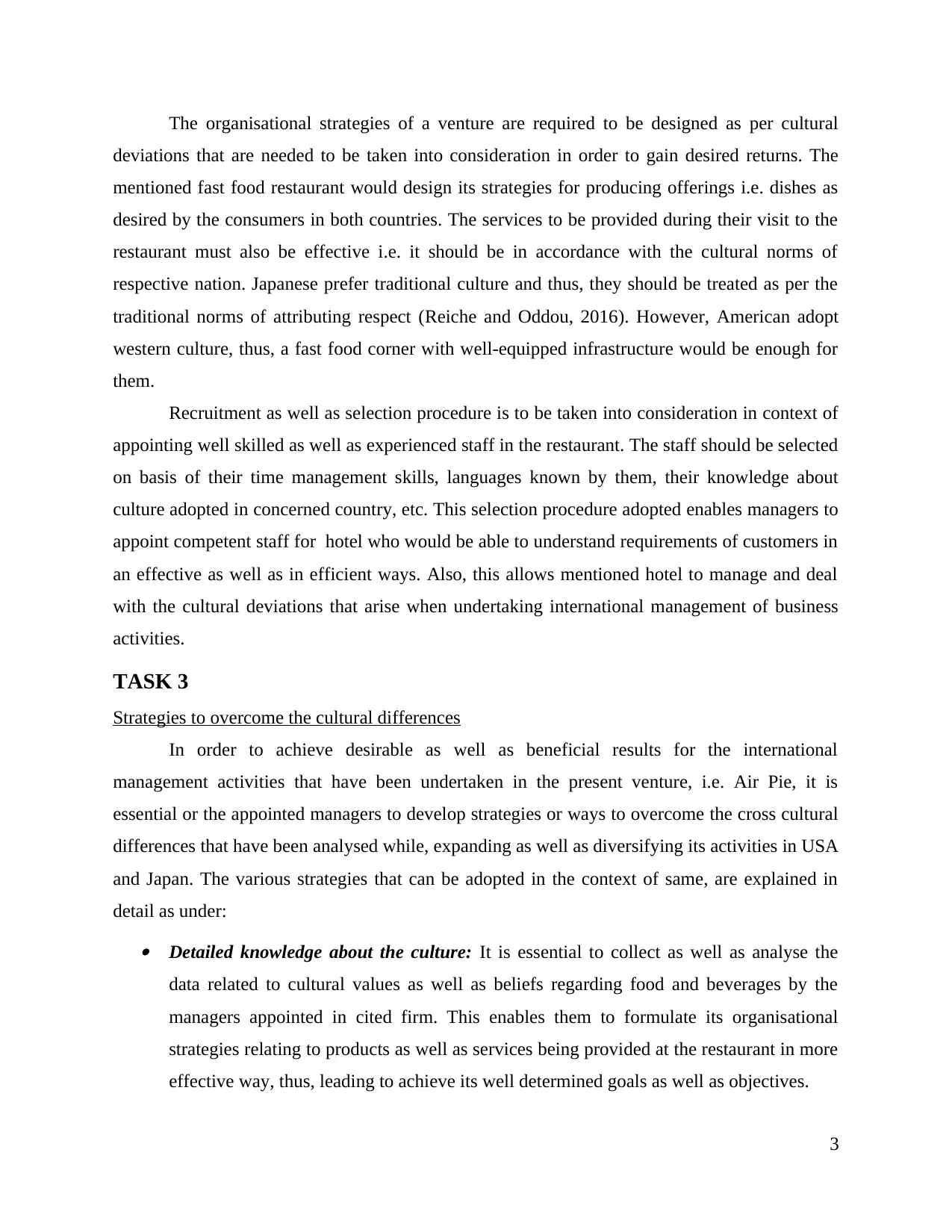
The organisational strategies of a venture are required to be designed as per cultural
deviations that are needed to be taken into consideration in order to gain desired returns. The
mentioned fast food restaurant would design its strategies for producing offerings i.e. dishes as
desired by the consumers in both countries. The services to be provided during their visit to the
restaurant must also be effective i.e. it should be in accordance with the cultural norms of
respective nation. Japanese prefer traditional culture and thus, they should be treated as per the
traditional norms of attributing respect (Reiche and Oddou, 2016). However, American adopt
western culture, thus, a fast food corner with well-equipped infrastructure would be enough for
them.
Recruitment as well as selection procedure is to be taken into consideration in context of
appointing well skilled as well as experienced staff in the restaurant. The staff should be selected
on basis of their time management skills, languages known by them, their knowledge about
culture adopted in concerned country, etc. This selection procedure adopted enables managers to
appoint competent staff for hotel who would be able to understand requirements of customers in
an effective as well as in efficient ways. Also, this allows mentioned hotel to manage and deal
with the cultural deviations that arise when undertaking international management of business
activities.
TASK 3
Strategies to overcome the cultural differences
In order to achieve desirable as well as beneficial results for the international
management activities that have been undertaken in the present venture, i.e. Air Pie, it is
essential or the appointed managers to develop strategies or ways to overcome the cross cultural
differences that have been analysed while, expanding as well as diversifying its activities in USA
and Japan. The various strategies that can be adopted in the context of same, are explained in
detail as under: Detailed knowledge about the culture: It is essential to collect as well as analyse the
data related to cultural values as well as beliefs regarding food and beverages by the
managers appointed in cited firm. This enables them to formulate its organisational
strategies relating to products as well as services being provided at the restaurant in more
effective way, thus, leading to achieve its well determined goals as well as objectives.
3
deviations that are needed to be taken into consideration in order to gain desired returns. The
mentioned fast food restaurant would design its strategies for producing offerings i.e. dishes as
desired by the consumers in both countries. The services to be provided during their visit to the
restaurant must also be effective i.e. it should be in accordance with the cultural norms of
respective nation. Japanese prefer traditional culture and thus, they should be treated as per the
traditional norms of attributing respect (Reiche and Oddou, 2016). However, American adopt
western culture, thus, a fast food corner with well-equipped infrastructure would be enough for
them.
Recruitment as well as selection procedure is to be taken into consideration in context of
appointing well skilled as well as experienced staff in the restaurant. The staff should be selected
on basis of their time management skills, languages known by them, their knowledge about
culture adopted in concerned country, etc. This selection procedure adopted enables managers to
appoint competent staff for hotel who would be able to understand requirements of customers in
an effective as well as in efficient ways. Also, this allows mentioned hotel to manage and deal
with the cultural deviations that arise when undertaking international management of business
activities.
TASK 3
Strategies to overcome the cultural differences
In order to achieve desirable as well as beneficial results for the international
management activities that have been undertaken in the present venture, i.e. Air Pie, it is
essential or the appointed managers to develop strategies or ways to overcome the cross cultural
differences that have been analysed while, expanding as well as diversifying its activities in USA
and Japan. The various strategies that can be adopted in the context of same, are explained in
detail as under: Detailed knowledge about the culture: It is essential to collect as well as analyse the
data related to cultural values as well as beliefs regarding food and beverages by the
managers appointed in cited firm. This enables them to formulate its organisational
strategies relating to products as well as services being provided at the restaurant in more
effective way, thus, leading to achieve its well determined goals as well as objectives.
3
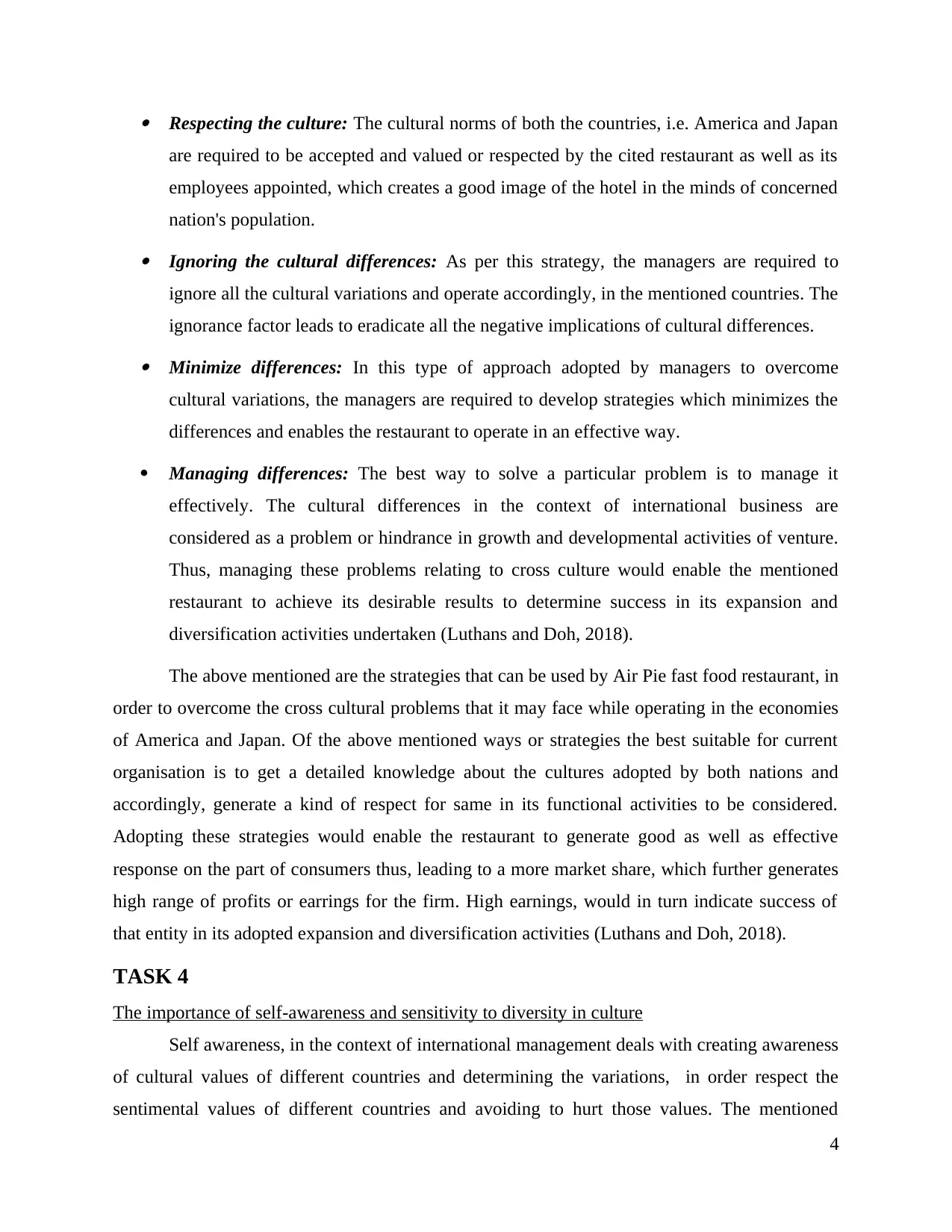
Respecting the culture: The cultural norms of both the countries, i.e. America and Japan
are required to be accepted and valued or respected by the cited restaurant as well as its
employees appointed, which creates a good image of the hotel in the minds of concerned
nation's population. Ignoring the cultural differences: As per this strategy, the managers are required to
ignore all the cultural variations and operate accordingly, in the mentioned countries. The
ignorance factor leads to eradicate all the negative implications of cultural differences. Minimize differences: In this type of approach adopted by managers to overcome
cultural variations, the managers are required to develop strategies which minimizes the
differences and enables the restaurant to operate in an effective way.
Managing differences: The best way to solve a particular problem is to manage it
effectively. The cultural differences in the context of international business are
considered as a problem or hindrance in growth and developmental activities of venture.
Thus, managing these problems relating to cross culture would enable the mentioned
restaurant to achieve its desirable results to determine success in its expansion and
diversification activities undertaken (Luthans and Doh, 2018).
The above mentioned are the strategies that can be used by Air Pie fast food restaurant, in
order to overcome the cross cultural problems that it may face while operating in the economies
of America and Japan. Of the above mentioned ways or strategies the best suitable for current
organisation is to get a detailed knowledge about the cultures adopted by both nations and
accordingly, generate a kind of respect for same in its functional activities to be considered.
Adopting these strategies would enable the restaurant to generate good as well as effective
response on the part of consumers thus, leading to a more market share, which further generates
high range of profits or earrings for the firm. High earnings, would in turn indicate success of
that entity in its adopted expansion and diversification activities (Luthans and Doh, 2018).
TASK 4
The importance of self-awareness and sensitivity to diversity in culture
Self awareness, in the context of international management deals with creating awareness
of cultural values of different countries and determining the variations, in order respect the
sentimental values of different countries and avoiding to hurt those values. The mentioned
4
are required to be accepted and valued or respected by the cited restaurant as well as its
employees appointed, which creates a good image of the hotel in the minds of concerned
nation's population. Ignoring the cultural differences: As per this strategy, the managers are required to
ignore all the cultural variations and operate accordingly, in the mentioned countries. The
ignorance factor leads to eradicate all the negative implications of cultural differences. Minimize differences: In this type of approach adopted by managers to overcome
cultural variations, the managers are required to develop strategies which minimizes the
differences and enables the restaurant to operate in an effective way.
Managing differences: The best way to solve a particular problem is to manage it
effectively. The cultural differences in the context of international business are
considered as a problem or hindrance in growth and developmental activities of venture.
Thus, managing these problems relating to cross culture would enable the mentioned
restaurant to achieve its desirable results to determine success in its expansion and
diversification activities undertaken (Luthans and Doh, 2018).
The above mentioned are the strategies that can be used by Air Pie fast food restaurant, in
order to overcome the cross cultural problems that it may face while operating in the economies
of America and Japan. Of the above mentioned ways or strategies the best suitable for current
organisation is to get a detailed knowledge about the cultures adopted by both nations and
accordingly, generate a kind of respect for same in its functional activities to be considered.
Adopting these strategies would enable the restaurant to generate good as well as effective
response on the part of consumers thus, leading to a more market share, which further generates
high range of profits or earrings for the firm. High earnings, would in turn indicate success of
that entity in its adopted expansion and diversification activities (Luthans and Doh, 2018).
TASK 4
The importance of self-awareness and sensitivity to diversity in culture
Self awareness, in the context of international management deals with creating awareness
of cultural values of different countries and determining the variations, in order respect the
sentimental values of different countries and avoiding to hurt those values. The mentioned
4
⊘ This is a preview!⊘
Do you want full access?
Subscribe today to unlock all pages.

Trusted by 1+ million students worldwide
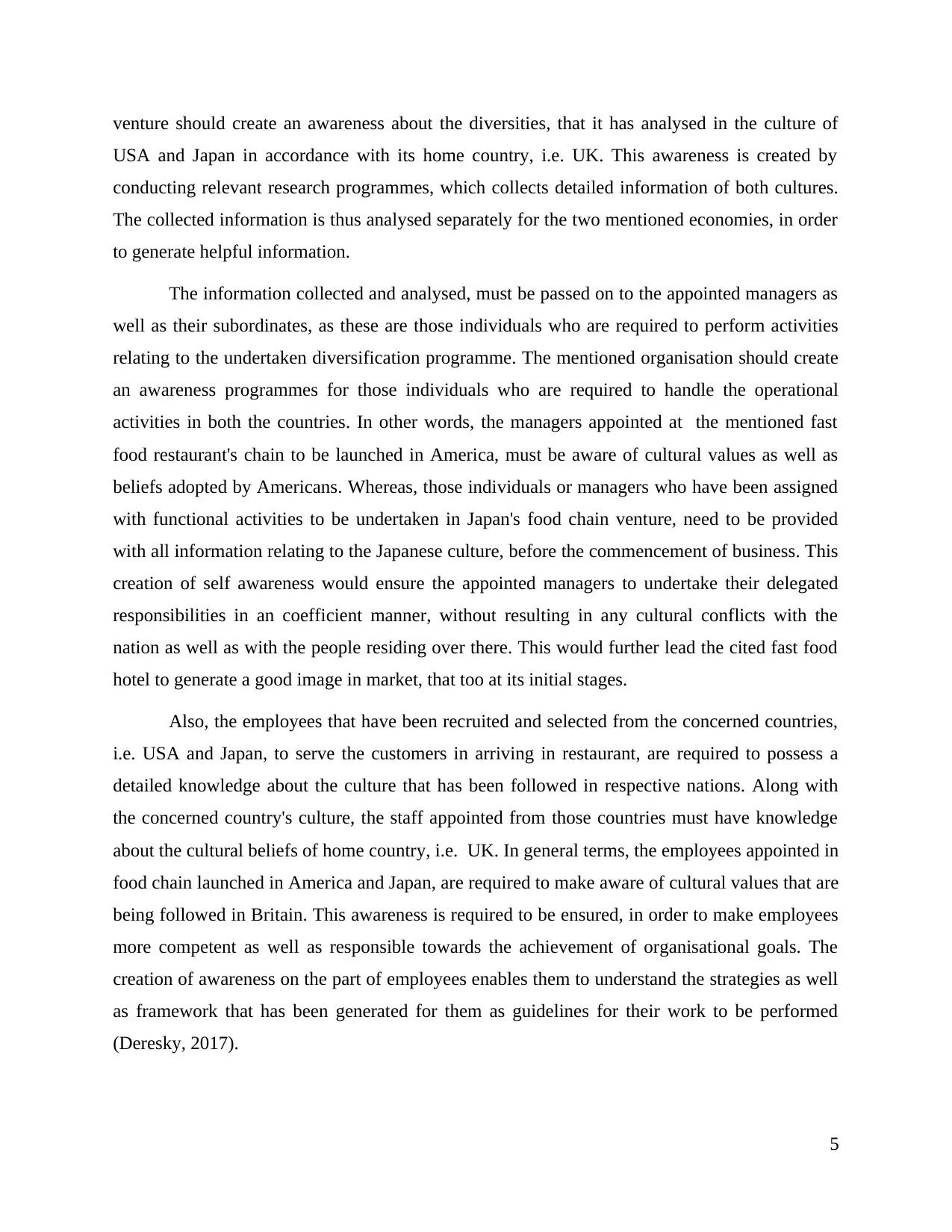
venture should create an awareness about the diversities, that it has analysed in the culture of
USA and Japan in accordance with its home country, i.e. UK. This awareness is created by
conducting relevant research programmes, which collects detailed information of both cultures.
The collected information is thus analysed separately for the two mentioned economies, in order
to generate helpful information.
The information collected and analysed, must be passed on to the appointed managers as
well as their subordinates, as these are those individuals who are required to perform activities
relating to the undertaken diversification programme. The mentioned organisation should create
an awareness programmes for those individuals who are required to handle the operational
activities in both the countries. In other words, the managers appointed at the mentioned fast
food restaurant's chain to be launched in America, must be aware of cultural values as well as
beliefs adopted by Americans. Whereas, those individuals or managers who have been assigned
with functional activities to be undertaken in Japan's food chain venture, need to be provided
with all information relating to the Japanese culture, before the commencement of business. This
creation of self awareness would ensure the appointed managers to undertake their delegated
responsibilities in an coefficient manner, without resulting in any cultural conflicts with the
nation as well as with the people residing over there. This would further lead the cited fast food
hotel to generate a good image in market, that too at its initial stages.
Also, the employees that have been recruited and selected from the concerned countries,
i.e. USA and Japan, to serve the customers in arriving in restaurant, are required to possess a
detailed knowledge about the culture that has been followed in respective nations. Along with
the concerned country's culture, the staff appointed from those countries must have knowledge
about the cultural beliefs of home country, i.e. UK. In general terms, the employees appointed in
food chain launched in America and Japan, are required to make aware of cultural values that are
being followed in Britain. This awareness is required to be ensured, in order to make employees
more competent as well as responsible towards the achievement of organisational goals. The
creation of awareness on the part of employees enables them to understand the strategies as well
as framework that has been generated for them as guidelines for their work to be performed
(Deresky, 2017).
5
USA and Japan in accordance with its home country, i.e. UK. This awareness is created by
conducting relevant research programmes, which collects detailed information of both cultures.
The collected information is thus analysed separately for the two mentioned economies, in order
to generate helpful information.
The information collected and analysed, must be passed on to the appointed managers as
well as their subordinates, as these are those individuals who are required to perform activities
relating to the undertaken diversification programme. The mentioned organisation should create
an awareness programmes for those individuals who are required to handle the operational
activities in both the countries. In other words, the managers appointed at the mentioned fast
food restaurant's chain to be launched in America, must be aware of cultural values as well as
beliefs adopted by Americans. Whereas, those individuals or managers who have been assigned
with functional activities to be undertaken in Japan's food chain venture, need to be provided
with all information relating to the Japanese culture, before the commencement of business. This
creation of self awareness would ensure the appointed managers to undertake their delegated
responsibilities in an coefficient manner, without resulting in any cultural conflicts with the
nation as well as with the people residing over there. This would further lead the cited fast food
hotel to generate a good image in market, that too at its initial stages.
Also, the employees that have been recruited and selected from the concerned countries,
i.e. USA and Japan, to serve the customers in arriving in restaurant, are required to possess a
detailed knowledge about the culture that has been followed in respective nations. Along with
the concerned country's culture, the staff appointed from those countries must have knowledge
about the cultural beliefs of home country, i.e. UK. In general terms, the employees appointed in
food chain launched in America and Japan, are required to make aware of cultural values that are
being followed in Britain. This awareness is required to be ensured, in order to make employees
more competent as well as responsible towards the achievement of organisational goals. The
creation of awareness on the part of employees enables them to understand the strategies as well
as framework that has been generated for them as guidelines for their work to be performed
(Deresky, 2017).
5
Paraphrase This Document
Need a fresh take? Get an instant paraphrase of this document with our AI Paraphraser
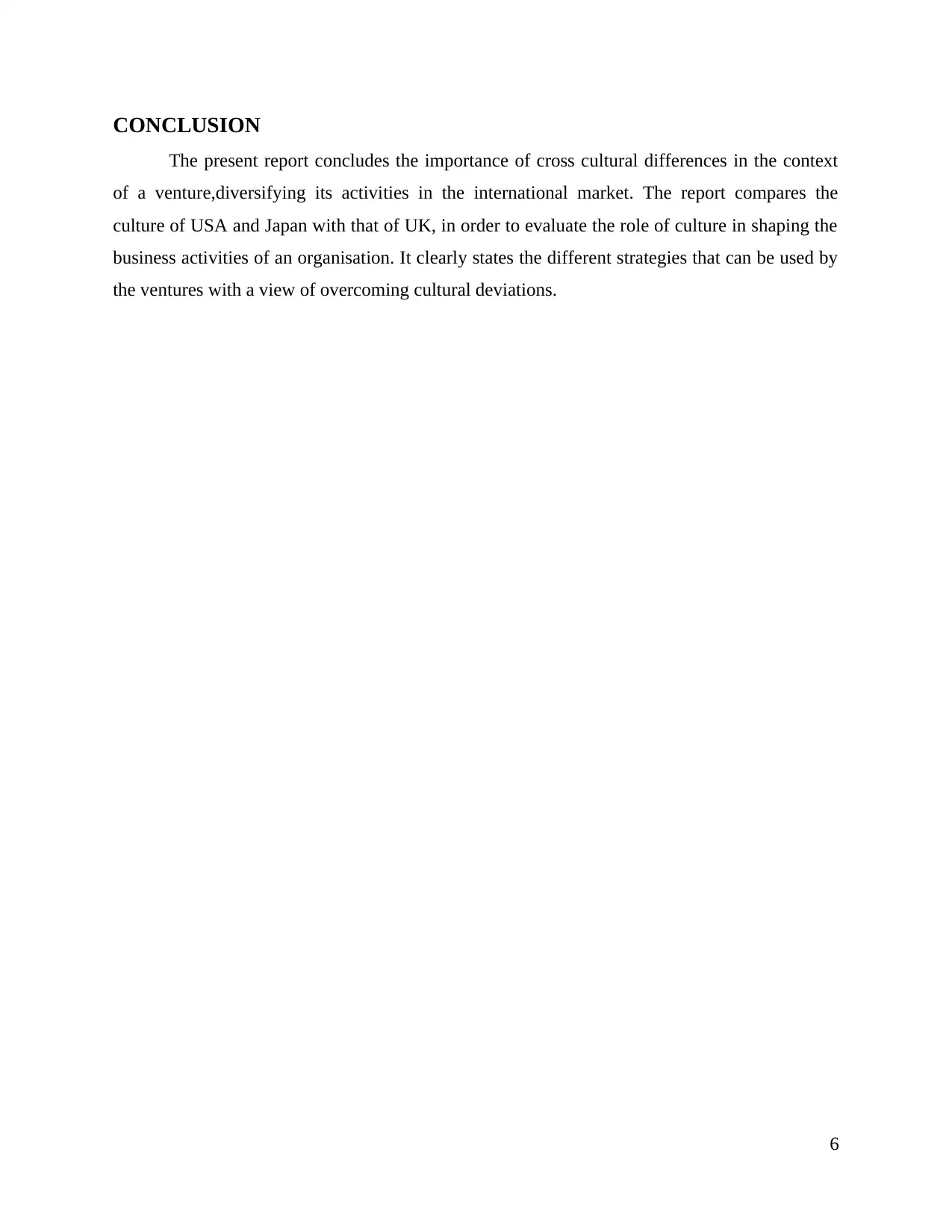
CONCLUSION
The present report concludes the importance of cross cultural differences in the context
of a venture,diversifying its activities in the international market. The report compares the
culture of USA and Japan with that of UK, in order to evaluate the role of culture in shaping the
business activities of an organisation. It clearly states the different strategies that can be used by
the ventures with a view of overcoming cultural deviations.
6
The present report concludes the importance of cross cultural differences in the context
of a venture,diversifying its activities in the international market. The report compares the
culture of USA and Japan with that of UK, in order to evaluate the role of culture in shaping the
business activities of an organisation. It clearly states the different strategies that can be used by
the ventures with a view of overcoming cultural deviations.
6
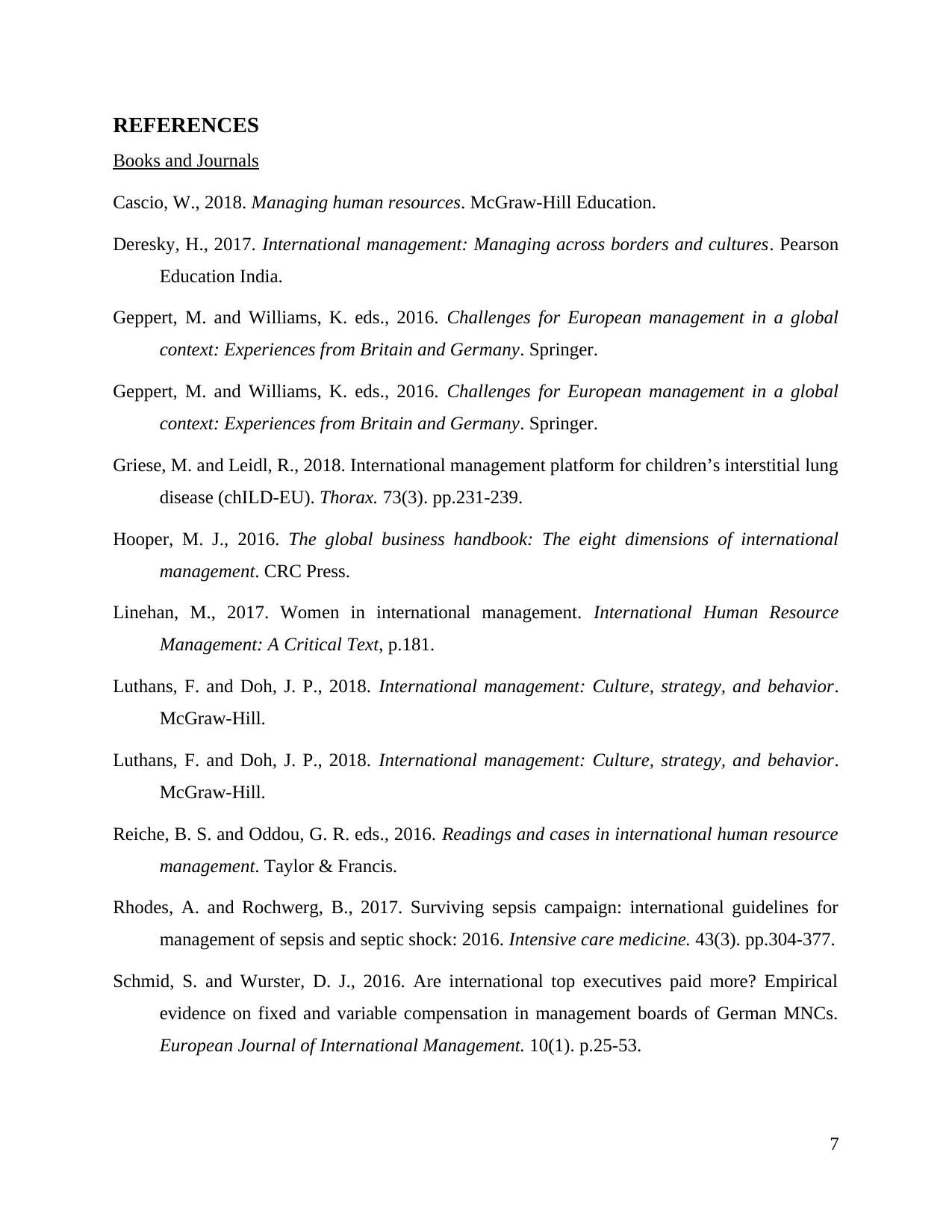
REFERENCES
Books and Journals
Cascio, W., 2018. Managing human resources. McGraw-Hill Education.
Deresky, H., 2017. International management: Managing across borders and cultures. Pearson
Education India.
Geppert, M. and Williams, K. eds., 2016. Challenges for European management in a global
context: Experiences from Britain and Germany. Springer.
Geppert, M. and Williams, K. eds., 2016. Challenges for European management in a global
context: Experiences from Britain and Germany. Springer.
Griese, M. and Leidl, R., 2018. International management platform for children’s interstitial lung
disease (chILD-EU). Thorax. 73(3). pp.231-239.
Hooper, M. J., 2016. The global business handbook: The eight dimensions of international
management. CRC Press.
Linehan, M., 2017. Women in international management. International Human Resource
Management: A Critical Text, p.181.
Luthans, F. and Doh, J. P., 2018. International management: Culture, strategy, and behavior.
McGraw-Hill.
Luthans, F. and Doh, J. P., 2018. International management: Culture, strategy, and behavior.
McGraw-Hill.
Reiche, B. S. and Oddou, G. R. eds., 2016. Readings and cases in international human resource
management. Taylor & Francis.
Rhodes, A. and Rochwerg, B., 2017. Surviving sepsis campaign: international guidelines for
management of sepsis and septic shock: 2016. Intensive care medicine. 43(3). pp.304-377.
Schmid, S. and Wurster, D. J., 2016. Are international top executives paid more? Empirical
evidence on fixed and variable compensation in management boards of German MNCs.
European Journal of International Management. 10(1). p.25-53.
7
Books and Journals
Cascio, W., 2018. Managing human resources. McGraw-Hill Education.
Deresky, H., 2017. International management: Managing across borders and cultures. Pearson
Education India.
Geppert, M. and Williams, K. eds., 2016. Challenges for European management in a global
context: Experiences from Britain and Germany. Springer.
Geppert, M. and Williams, K. eds., 2016. Challenges for European management in a global
context: Experiences from Britain and Germany. Springer.
Griese, M. and Leidl, R., 2018. International management platform for children’s interstitial lung
disease (chILD-EU). Thorax. 73(3). pp.231-239.
Hooper, M. J., 2016. The global business handbook: The eight dimensions of international
management. CRC Press.
Linehan, M., 2017. Women in international management. International Human Resource
Management: A Critical Text, p.181.
Luthans, F. and Doh, J. P., 2018. International management: Culture, strategy, and behavior.
McGraw-Hill.
Luthans, F. and Doh, J. P., 2018. International management: Culture, strategy, and behavior.
McGraw-Hill.
Reiche, B. S. and Oddou, G. R. eds., 2016. Readings and cases in international human resource
management. Taylor & Francis.
Rhodes, A. and Rochwerg, B., 2017. Surviving sepsis campaign: international guidelines for
management of sepsis and septic shock: 2016. Intensive care medicine. 43(3). pp.304-377.
Schmid, S. and Wurster, D. J., 2016. Are international top executives paid more? Empirical
evidence on fixed and variable compensation in management boards of German MNCs.
European Journal of International Management. 10(1). p.25-53.
7
⊘ This is a preview!⊘
Do you want full access?
Subscribe today to unlock all pages.

Trusted by 1+ million students worldwide

8
1 out of 10
Related Documents
Your All-in-One AI-Powered Toolkit for Academic Success.
+13062052269
info@desklib.com
Available 24*7 on WhatsApp / Email
![[object Object]](/_next/static/media/star-bottom.7253800d.svg)
Unlock your academic potential
Copyright © 2020–2025 A2Z Services. All Rights Reserved. Developed and managed by ZUCOL.





